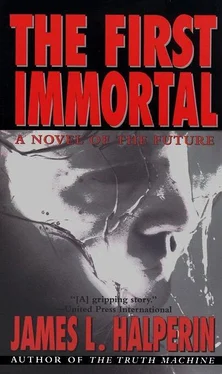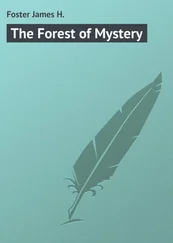“Not at all. I don’t want this disease eating into my brain. I’m still lucid and fairly strong now. Within six months, I won’t be.”
Rebecca read a carefully worded statement: “She wishes to be frozen, just like her grandfather, in hope of being revived decades or even centuries from now, when and if medical science can restore her health. Her father, brother, and I support her decision.”
My grandfather, George Crane, Sr., holding Katie’s left hand, and twenty-seven-year-old George Jr., my father, standing at her right side, each signaled their agreement. “Yes, that’s right,” George Sr. said, smiling down at his daughter.
“Thank you, Daddy,” she said, then looked toward Gary and Maxine, “and thanks so much to everyone here. I love you all.”
Kevorkian scowled faintly, and addressed Katie again in his trademark humorless tone: morbid yet compassionate gentleness. The seventy-two-year-old “obitiatrist” had asked the same questions dozens of times before. “You understand what you’re asking me to do, right?”
“Yes.”
“You want me to help you end your life?”
“Absolutely, yes.”
“You realize that I can set up the equipment, but you will have to trigger the device yourself.”
“Yes, I know that.”
“You know you can stop anytime you wish.”
“I won’t stop.”
“But you can stop; you don’t have to go through with it.”
“I know.”
“Katie, how did you feel upon learning you had a terminal disease?”
“Depressed.”
“I see. And at the time you first decided to contact me, were you still depressed?”
She considered this for several seconds before answering, “No. Not anymore.”
“Then what prompted your decision?”
Now Katie did not hesitate. “Logic,” she said.
Kevorkian nodded his head several times, then asked the question he’d recently begun asking all of his younger patients: “Have you considered whether you’d be willing to donate any of your organs to help save the lives or eyesight of others?”
Even though she’d made her decision days ago, Katie pondered the question carefully. “If science can bring me back to life, growing new organs should be a simple problem for them. Since I have cancer, I doubt anyone would want my internal organs other than for research. But the corneas should be fine. Okay, Doctor, take what you want. Just make sure they freeze my brain first.”
Gary knew that Rebecca and her family were secretly horrified, but also determined to honor Katie’s judgment; they’d kept their thoughts to themselves in deference to her wishes. But he grinned at Katie, his eyes locking onto hers. To him, her decision seemed utterly sensible. Anytime a person under sixty years of age died, he thought, medics should harvest any transplantable organs and just worry about preserving the brain.
She smiled back.
“Katie,” Kevorkian asked, “what does it mean when you end your life; when you stop living?”
“It means I’m dead—unless cryonics works and science can someday repair my body. I know my chances of ever being alive again aren’t so good. But even if I weren’t being frozen, I’d still want to die now. Now, while I can think for myself, and laugh, and easily bear the pain, and return the love of those who love me. I want to die now, tonight.”
“Some say you’re doing the wrong thing, Katie. What would you tell them?”
“I’d tell them that it’s my life, my body, my brain, my identity, my pain, and my hope. I know what I want, Dr. Kevorkian. I want to die; to be frozen with my Grampy.”
Beside the bed, like a crazy basement-dwelling aunt whom nobody discussed, lurked a canister with hose and face mask. Everyone in the room knew it was there, and they all tried not to look at it, as if such conduct might remind them of why they were there or, worse, might make Katie feel rushed. She’d already rehearsed her suicide twice, hours ago, and now it seemed as if she was procrastinating; perhaps trying to keep the “party” going just a little while longer than etiquette might dictate.
Kevorkian reassured her, “Take as much time as you need, Katie. No one’s in any hurry tonight.”
“What time is it?” she asked. In truth, she felt weary and yearned to end it right then, but refused to reveal these emotions. Her work was not yet finished.
Gary looked at his watch and said “seven-thirty” at exactly the moment Jan walked through the door.
Right on time, Katie thought. Good! She looked at her handsome uncle, and his weathered, angular features seemingly demanding explanation. This was perfect.
“What are you doing here?” Gary asked abruptly, instantly regretting it.
“I invited her to come,” Katie said. “I’m sorry; I hope it’s all right.”
“Of course,” Gary said, not meaning it.
Jan hugged Rebecca, Max, both Georges, and Katie; then seated herself next to George Jr., who was perched on the right side of the bed. She looked toward Gary.
Here it comes, he thought, throbbing with rage: the mea culpa that’s supposed to make everything fine again.
“Look, Gary, I made a terrible mistake,” Jan blurted. “I was dumb and blind and careless. We needed money. Noah seemed so sure it was the right thing to do, and I guess I wanted to believe it, too. But it wasn’t right, what we did. I never should have gone along with that lawsuit. I screwed up, and there’s nothing I can do about it now. The worst thing is that if we’d won, I’d probably be gloating to myself and wallowing in self-righteousness, instead of groveling like I am now.”
“All true,” Gary said, his heart falling to liquid-nitrogen temperature. She’d blown the Trust, and had cost Toby nearly five years of his life. For nothing. Worst of all, she’d tried to end their Dad’s hope of ever living again. And his own sole hope of ever really knowing his father. Suddenly Gary was reminded of the morning seventeen years ago when Ben Smith had first tried to reconcile with him. An apology did not make up for years of outrage, he’d thought then, just as he thought it now.
“Gary, I love my husband,” she said, “and I loved Daddy. You know how much I loved him.” The insinuation remained unsaid, but fully understood: a hell of a lot more than you did, big brother! “And maybe when I lost one of them, it made me need the other even more.”
She pressed on, seemingly undeterred by his frigid silence. “Maybe I don’t deserve your forgiveness, but I’m still your sister. I need you in my life. I’ve always loved you.”
And he loved her, too, he realized. But so what? How could he ever trust her?
“Uncle Gary,” Katie interrupted, “I asked her to come because—”
Suddenly he felt self-centered and thoughtless. “Yes,” he said, tears of shame and love and sadness in his eyes. “Because you’re generous, wise, thoughtful, and… amazing. Here you are, about to end your life, maybe forever, and all you want is to leave us happy; you want what’s best for us.”
Katie recoiled. “No!” she whispered, and slowly, puffing in pain, pulled herself up until she sat, her eyes glaring defiantly. “When I wake up, I want us all to be together. Because I’m selfish, just like everyone else.”
Gary found himself stunned by the truth of his niece’s declaration. For nearly a minute he stood rooted, staring at her. Then he finally turned to Jan and opened his arms.
As soon as his sister rose, Gary hugged her hard. “When I get home,” he said, “I’ll set up a life insurance policy for everyone in our family, with the Phoenix as beneficiary. If I have anything to say about it, we’ll always be together.”
December 31, 2000
—Oracle CEO Larry Ellison, Americas third richest person, predicts by the mid-21st century a scientific revolution that will cure nearly every disease and initiate an era of universal prosperity. “Within a few decades, we’ll have computers every bit as smart as humans,” Ellison proclaims in a Fortune magazine interview, “and 10,000 times as fast. Problems that would take scientists 10,000 years to crack, they’ll solve in a year!”—Dr. Jack Kevorkian is indicted in two states for abetting nine separate violations of organ-donation statutes. He stands accused of coercing patients whose suicides he has supervised into agreeing to donate their organs to save the lives of others. Several family members of those donor patients rush to defend Kevorkian’s actions.—As midnight tonight, the one-year anniversary of the Y2K Disaster, approaches, the Federal Reserve Board issues its final report on anticipated long-term effects of the worldwide computer glitch. Blaming most current stock market and other economic woes on lawsuits, spiraling information-technology costs for businesses, numerous Asian and European bank failures, and Japan’s recent threat to return its currency to a gold standard, the Fed report predicts that today’s oppressive inflation and interest rates “can be expected to continue unabated, probably for many years.”
Читать дальше












